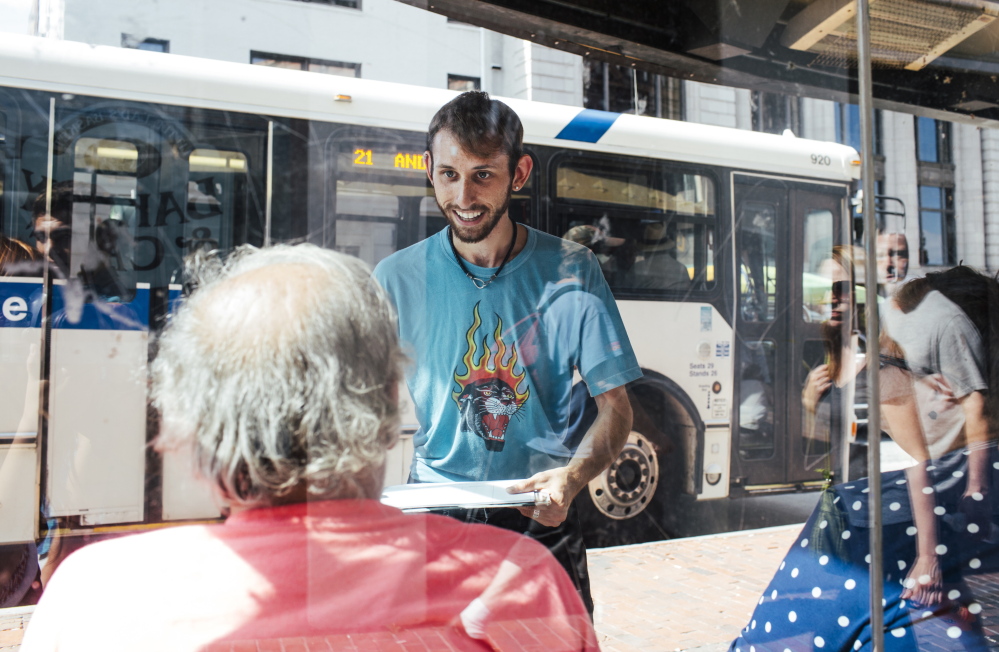The organization behind an effort to raise Maine’s minimum wage to $12 an hour has been advertising for new workers at a rate closer to $10 an hour.
An online ad posted Tuesday by the Maine People’s Alliance indicates new phone canvassers/organizers would be paid $429 every two weeks for working 21.25 hours a week. That works out to $10.09 an hour, considerably less than the $12 minimum wage the alliance is seeking by 2020. The discrepancy was first reported by the Washington Free Beacon, a Washington, D.C.-based conservative news and commentary website.
Mike Tipping, communications director for the people’s alliance, said the job posting’s $429 figure was the result of bad math. The original posting was replaced Thursday with a new listing advertising a wage of $510 biweekly, which is exactly $12 an hour.
The revised listing wasn’t posted until after the Free Beacon reported on the original, but Tipping said MPA employees always have been paid at least $12 an hour. Alliance job postings on Facebook and job websites going back to February advertise a starting rate of $480 a week for full-time positions.
Tipping said he was disappointed to see opponents of increasing the minimum wage seize on an honest mistake.
“Of course we pay our canvassers above $12 an hour, and the reason our opposition is seizing on this lie is because they are desperate,” he said. “Maine people know the minimum wage is not enough to live on, and for thousands of seniors who can’t retire and single parents who are struggling to raise kids on poverty wages, we’re going to get this passed.”
ERROR-OR-HYPOCRISY QUESTION
Dana Connors, president of the Maine State Chamber of Commerce, said he takes Tipping at his word that the posting was a mistake, but the “optics smack of a double standard.” The state chamber has been one of the leading groups opposing the minimum wage referendum because, Connors said, it increases the wage too much too fast, and because it phases out the credit for tipped workers, such as restaurant servers.
“If this is so important to MPA, it’s an unfortunate mistake. They should certainly practice what they preach,” he said.
Michael Saltsman, research director for the Employment Policies Institute, a free-market group partially funded by the restaurant industry and an opponent of minimum wage increases, tracks the issue around the country and saw the MPA’s job posting this week.
“I think it’s consistent with the ‘Do as I say, not as I do’ attitude of those who support increasing the minimum wage,” Saltsman said. “Now it seems like they are adjusting the wage as they go after being called out.”
Tipping, though, said that when the job was posted, the MPA employee cut-and-pasted from an old job advertisement and calculated the pay incorrectly. He said the alliance used to use a training wage of $10.10 for canvassers, who graduated to $12 an hour after the first few days. The $429 figure, he said, was calculated using the training wage, which the MPA stopped offering new workers as of last year. He pointed to other ads for jobs at the MPA that listed $480 biweekly for a 20-hour week, which is $12 an hour.
The MPA, along with the Maine Small Business Coalition, an affiliate group, and the Maine AFL-CIO, launched a signature-gathering effort last year to put a minimum wage question on the ballot, and this year turned in more than 75,000 signatures.
Question 4 on the November statewide ballot will read: “Do you want to raise the minimum hourly wage of $7.50 to $9 in 2017, with annual $1 increases up to $12 in 2020, and annual cost-of-living increases thereafter; and do you want to raise the direct wage for service workers who receive tips from half the minimum wage to $5 in 2017, with annual $1 increases until it reaches the adjusted minimum wage?”
The minimum wage has been a hotly debated topic at the State House for several years, but lawmakers have not acted.
This spring, after the MPA successfully turned in its signatures, Republican lawmakers tried to pass a competing ballot measure that would have raised the minimum wage to $10 an hour by 2020. That measure, which was backed by the state chamber, failed to generate enough support.
SOME CITIES HIKE MINIMUM WAGE
Saltsman, the Washington researcher, said his organization believes increasing the minimum wage is counterproductive and has a “demonstrated potential to reduce employment for the least-skilled employees.” That argument also has been made by some in Maine who fear that some small businesses simply might not be able to afford to pay the higher wage.
The fight for a higher minimum has played out in states and cities across the country in recent years. Big cities such as Seattle and San Francisco have increased their wages to $15, although San Francisco’s won’t reach that level until 2018.
The city of Portland also debated raising the wage to $15 last year, but eventually settled on $10.10 an hour, with another increase in 2017 and future increases tied to the Consumer Price Index, which accounts for inflation.
Staff Writer Matt Byrne contributed to this report.
Send questions/comments to the editors.




Comments are no longer available on this story